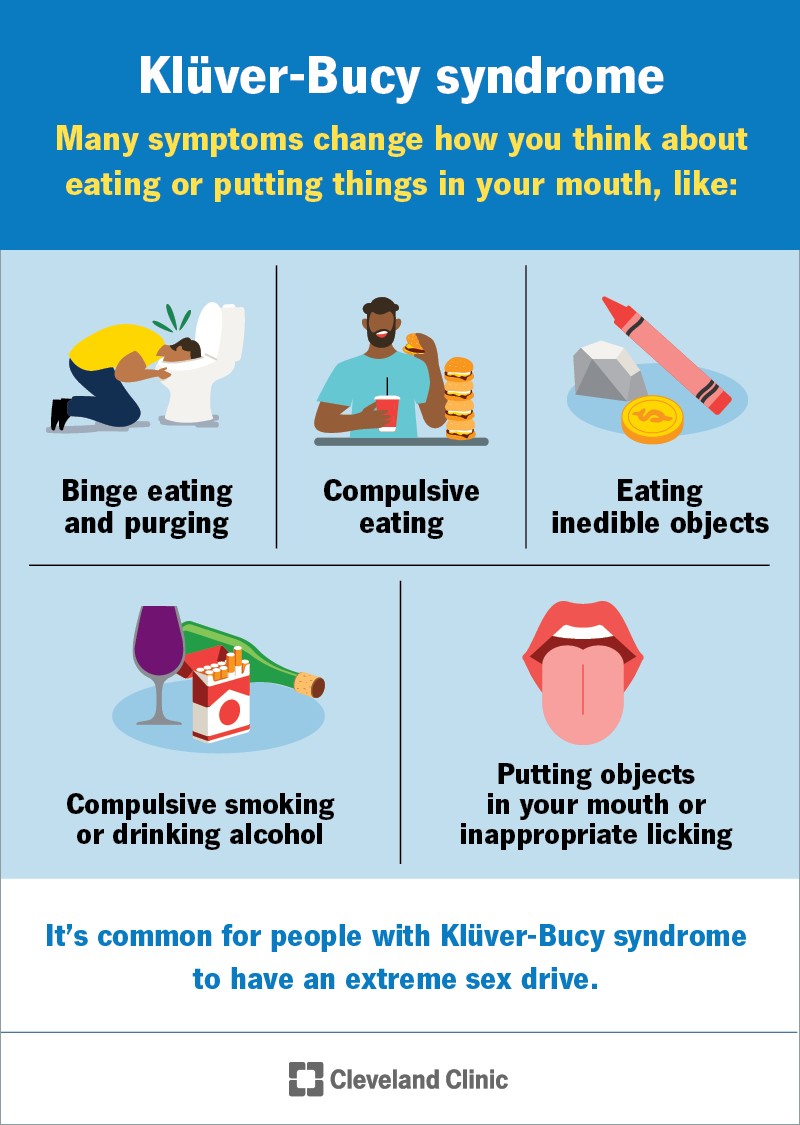Klüver-Bucy syndrome (KBS) is an extremely rare brain disorder that can cause memory loss and behavioral problems. It happens due to brain injury or other neurological conditions, including herpes simplex encephalitis. Symptoms typically involve dietary and social or sexual behaviors, as well as memory loss.
Advertisement
Cleveland Clinic is a non-profit academic medical center. Advertising on our site helps support our mission. We do not endorse non-Cleveland Clinic products or services. Policy
Klüver-Bucy syndrome (KBS) is an extremely rare brain disorder that can cause memory loss and behavioral problems. Some people with this disease try to eat nonfood items. Others have an unusually intense sex drive. In severe cases, symptoms include seizures and dementia.
Advertisement
Cleveland Clinic is a non-profit academic medical center. Advertising on our site helps support our mission. We do not endorse non-Cleveland Clinic products or services. Policy
Damage to your temporal lobes causes Klüver-Bucy (pronounced KLOO-ver BYU-see) syndrome. This part of your brain helps:
Symptoms usually start after a brain injury or health condition damages both your temporal lobes. It can affect anyone, including children.
There’s no cure for KBS. But treatment can help reduce symptoms. Early diagnosis is important.

Image content: This image is available to view online.
View image online (https://my.clevelandclinic.org/-/scassets/images/org/health/articles/kluver-bucy-syndrome)
Klüver-Bucy syndrome can cause a variety of symptoms. Many symptoms change how you think about eating or putting things in your mouth, like:
It’s common for people with Klüver-Bucy syndrome to experience hypersexuality. This means you’ll have an extreme sex drive. You’ll want sex more often or more intensely than usual. Children with KBS may hold or rub their genitals or thrust their pelvis back and forth.
Other Klüver-Bucy syndrome symptoms affect how your brain works (its cognitive function). You might experience:
Advertisement
Klüver-Bucy syndrome happens when something damages your brain’s temporal lobes. Providers call this bilateral temporal lobe damage, meaning the damage affects the temporal lobe on both sides of your brain. You’re more likely to develop KBS if the damage affects your hippocampus or amygdala.
The damage is often due to a traumatic brain injury (TBI) or a stroke. Health conditions that damage your brain can also cause KBS. Examples include:
Healthcare providers sometimes use other names for Klüver-Bucy syndrome, depending on its cause. They might call it:
Having Klüver-Bucy syndrome can make you do things you usually wouldn’t. Some of these actions might be dangerous. Some examples include:
You may notice new symptoms or unusual behaviors in yourself or your child. Or your healthcare provider may notice symptoms during a checkup.
Tell your provider if you’ve noticed any new or different cravings or behaviors. Don’t be embarrassed or ashamed to talk to your provider about what you’re experiencing. The sooner you talk to a provider, the better. They can help you avoid dangerous complications.
Your provider will diagnose Klüver-Bucy syndrome with a physical exam and some tests, including:
Your provider will suggest treatments to manage the symptoms you’re experiencing. What you’ll need can vary. It usually depends on which symptoms you have and their severity.
Klüver-Bucy syndrome treatments can include:
Your provider will help you find treatments that reduce how often KBS symptoms affect your daily routine. There’s no cure for Klüver-Bucy syndrome. That’s because you can’t reverse the brain damage that causes it.
Advertisement
You should expect to manage Klüver-Bucy syndrome symptoms for a long time — probably for the rest of your life.
How much KBS affects you can vary depending on a few factors:
Your provider will help you set realistic goals and expectations.
Talk to a healthcare provider if you notice any new or changing symptoms. Let your provider know if it feels like you’re thinking or doing things you can’t control — especially if you feel unsafe. They might be able to adjust your treatments.
You might want to talk to a mental health professional. They can help you process your thoughts and feelings. They might be able to help you find safe, healthy ways to manage symptoms like pica and hypersexuality.
Questions you may want to ask your provider include:
Klüver-Bucy syndrome can make you think and do things you normally wouldn’t. But remember, you’re still you. It’s important to talk to a healthcare provider as soon as possible if you notice any KBS symptoms.
Advertisement
Your provider will help you understand what’s causing the changes in your behavior. They’ll help you find treatments to manage the symptoms so you feel like yourself again.
Advertisement

Sign up for our Health Essentials emails for expert guidance on nutrition, fitness, sleep, skin care and more.
Learn more about the Health Library and our editorial process.
Cleveland Clinic’s health articles are based on evidence-backed information and review by medical professionals to ensure accuracy, reliability and up-to-date clinical standards.
Cleveland Clinic’s health articles are based on evidence-backed information and review by medical professionals to ensure accuracy, reliability and up-to-date clinical standards.
Traumatic brain injuries can be serious or life-threatening. Cleveland Clinic’s experts provide fast treatment to give you the best chance of recovery.
